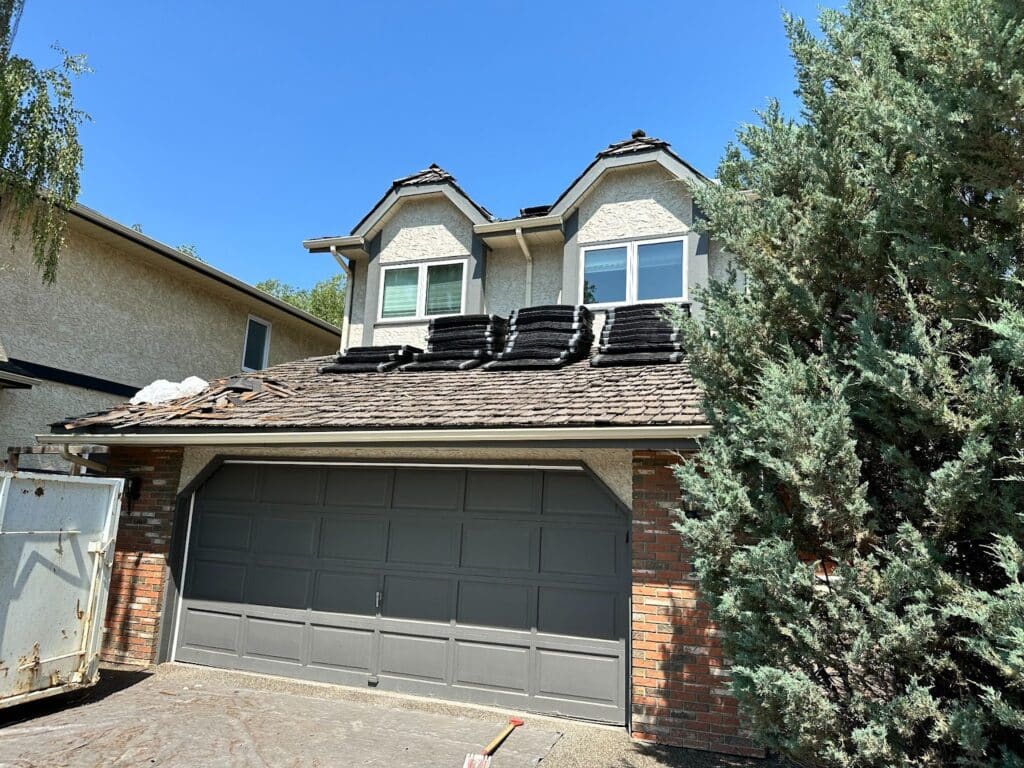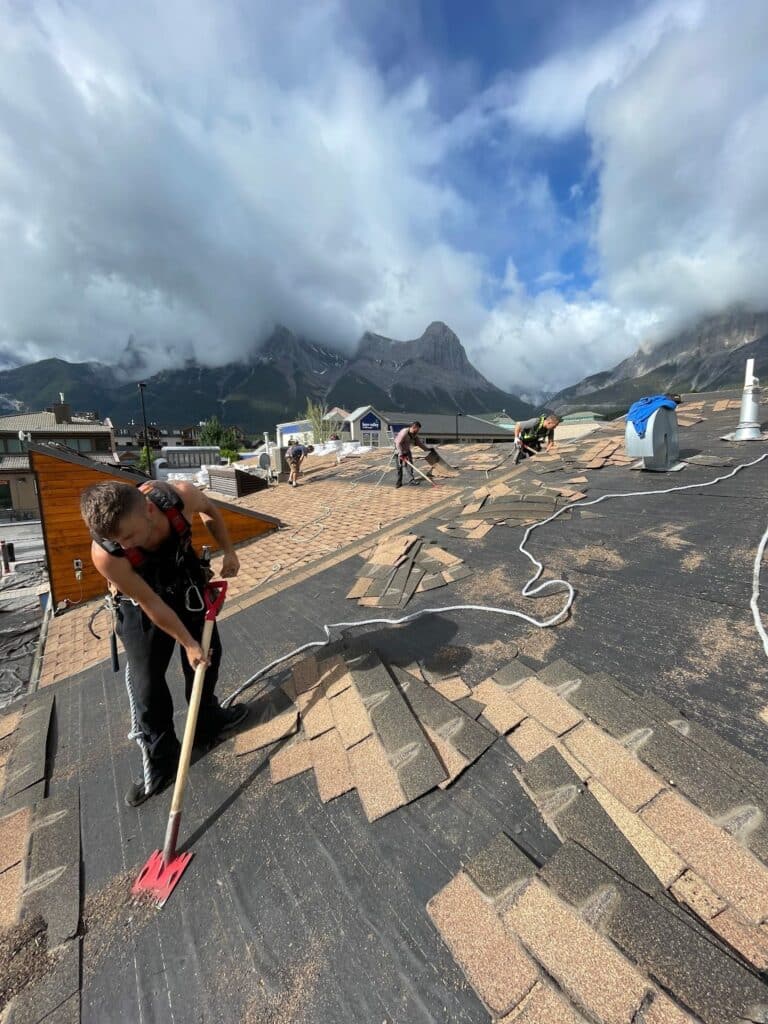Insurance Roof Repair Calgary | When it comes to your home, your roof is one of its most essential components. It protects your family, possessions, and the structural integrity of your house from the harsh elements. Over time, however, your roof may experience wear and tear, leading to the crucial decision: should you repair or replace your roof? This question can be particularly challenging for homeowners in Calgary, where unpredictable weather conditions, like heavy snow, hail, and high winds, take a toll on roofing systems.
Understanding the factors that influence this decision will help you save money, improve your home’s safety, and maintain peace of mind. In this blog, we’ll explore the key differences between roof repairs and replacements and provide tips for choosing the best option for your situation.
The Signs Your Roof Needs Attention
Before deciding whether to repair or replace your roof, it’s important to identify the signs that require attention. Some common indicators include:
- Leaking or water damage: Water stains on your ceilings or walls often signal a compromised roof.
- Missing or damaged shingles: Shingles protect your roof from moisture. If they’re cracked, curled, or missing altogether, your roof is vulnerable.
- Granule loss: If you notice granules from your asphalt shingles accumulating in your gutters, it’s a sign of aging shingles.
- Sagging rooflines: A sagging roof can indicate structural issues that need immediate attention.
- Increased energy bills: Poor insulation from a damaged roof can lead to higher heating or cooling costs.
If you’ve noticed any of these signs, it’s time to assess the extent of the damage to determine the best course of action.
When a Roof Repair is the Best Choice
Roof repair is often the most cost-effective solution for minor or localized issues. Here are some scenarios when repairs might be the right option:
1. Localized Damage
If only a small portion of your roof is damaged—such as a few shingles blown off during a windstorm—repairs are usually sufficient. A professional roofing contractor can match the replacement shingles to your existing roof, ensuring a seamless appearance.
2. Roof Age is on Your Side
If your roof is relatively new (under 10 years old) and still has plenty of life left, repairing specific problem areas can extend its lifespan.
3. Minor Leaks or Flashing Issues
Leaks caused by poor flashing or minor damage to the roofing material can often be repaired without replacing the entire roof. Flashing, which seals joints like chimneys and vents, is a common source of leaks and can usually be fixed with targeted repairs.

When Roof Replacement is Necessary
While repairs are an excellent solution for minor issues, there are instances where replacing the roof is the more practical and cost-effective choice in the long run.
1. Extensive Damage
If a significant portion of your roof has been damaged—whether by hailstorms, falling branches, or long-term neglect—replacement is often the best choice. Extensive damage can compromise the structural integrity of the roof, making repairs a temporary fix.
2. Your Roof is Near the End of its Lifespan
Different roofing materials have varying lifespans. For example, asphalt shingles typically last 20–30 years, while metal roofing can last up to 50 years. If your roof is approaching its expected lifespan, investing in a replacement might save you money and stress in the future.
3. Recurring Issues
If you find yourself scheduling frequent repairs, the costs can quickly add up. In such cases, a full roof replacement might be more economical and provide peace of mind with a new, durable system.
4. Energy Efficiency Goals
Older roofs often lack the energy-efficient technologies available today. If you’re aiming to improve your home’s insulation, ventilation, and overall energy efficiency, a roof replacement offers an opportunity to upgrade.

Factors to Consider in Making Your Decision
When deciding between repairing or replacing your roof, consider the following factors:
1. Cost
Roof repairs are typically more affordable than full replacements, but that doesn’t mean they’re always the best value. If repairs are frequent or the damage is extensive, replacement might be more cost-effective in the long term.
2. Future Plans for Your Home
If you’re planning to sell your home soon, a roof replacement can add significant value and appeal to buyers. Conversely, if you’re staying in your home for the foreseeable future, you may want to focus on a durable, long-term solution.
3. Insurance Coverage
In Calgary, extreme weather events such as hailstorms can cause significant roof damage. Fortunately, many homeowner insurance policies cover roof repairs or replacements due to weather-related incidents. If you’re filing a claim, work with an experienced contractor who understands Insurance Roof Repair Calgary processes to ensure you receive fair compensation.
4. Environmental Impact
Roof replacements generate more waste compared to repairs. If sustainability is a priority for you, opting for repairs when feasible—or choosing eco-friendly roofing materials for a replacement—can minimize your environmental footprint.
Choosing the Right Contractor
Whether you decide on a repair or replacement, hiring the right contractor is crucial to ensuring the job is done correctly. Look for a licensed, experienced roofer who offers transparent pricing, warranties, and positive customer reviews.
Lion Heart Roofing, for example, is committed to providing high-quality roofing solutions tailored to Calgary’s unique climate challenges. Their team can help you evaluate the condition of your roof and recommend the best course of action for your needs.
Final Thoughts
Your roof is an essential investment in the safety, comfort, and value of your home. Deciding whether to repair or replace it depends on several factors, including the extent of the damage, the age of your roof, and your long-term goals.
If you’re unsure about the best option for your situation, schedule a professional inspection to get expert advice. With the right guidance, you can make an informed decision that protects your home and provides lasting peace of mind.
Frequently Asked Questions About Roof Replacement vs. Repair
How do I know if my roof needs to be repaired or replaced?
The decision to repair or replace your roof depends on the extent of the damage, the age of your roof, and your budget. Small, localized issues like missing shingles or minor leaks can usually be fixed with repairs. However, if your roof is nearing the end of its lifespan, has extensive damage, or has recurring issues, replacement may be the better option.
What is the average lifespan of a roof?
The lifespan of a roof depends on the material used:
- Asphalt shingles: 20–30 years
- Metal roofing: 40–70 years
- Tile roofing: 50+ years
- Flat roofs: 10–20 years
Regular maintenance and inspections can help maximize your roof’s lifespan.
Can I repair my roof myself?
While minor issues like replacing a single shingle may seem manageable for a DIY project, roof repairs are often best left to professionals. Working on a roof can be dangerous without the proper equipment and training, and a professional contractor can ensure the repair is done correctly, preventing future problems.
How much does it cost to repair vs. replace a roof?
Costs vary depending on the size of your roof, the materials used, and the extent of the damage.
- Repairs can range from $150–$1,500 for minor issues.
- Replacements typically cost $5,000–$15,000 or more, depending on your roof’s material and size.
Getting a professional inspection and quote is the best way to determine the costs for your specific situation.
Does homeowners’ insurance cover roof repairs or replacement?
In many cases, homeowners’ insurance covers roof damage caused by unexpected events, such as hailstorms, high winds, or falling debris. However, coverage often depends on your policy and the cause of the damage. For example, insurance may not cover damage due to normal wear and tear or lack of maintenance.
If you’re in Calgary and have experienced storm-related damage, consult a contractor experienced in Insurance Roof Repair Calgary to help navigate the claims process.
Can I replace only part of my roof instead of the entire thing?
Yes, partial roof replacements are possible in certain situations, such as when damage is isolated to one section of the roof. However, this depends on the extent of the damage and whether the replacement materials can be matched to the existing roof. Keep in mind that partial replacements may not be as cost-effective as full replacements in the long term.
How can I prevent roof damage in the future?
Preventative maintenance is key to extending your roof’s lifespan. Here are a few tips:
- Address minor issues, like small leaks or loose shingles, before they become major problems.
- Schedule annual roof inspections.
- Clean your gutters regularly to prevent water buildup.
- Trim overhanging branches to minimize the risk of falling debris.
What is the best time of year for roof repairs or replacement?
Roof repairs and replacements can be done year-round, but spring, summer, and early fall are typically the best times due to favourable weather conditions. In Calgary, summer is ideal since the weather is more predictable, making it easier for contractors to work safely and efficiently.
How long does it take to repair or replace a roof?
The timeline depends on the scope of the project:
- A full roof replacement typically takes 2–5 days, depending on the size and complexity of the roof.
- Minor repairs may take just a few hours.
- Larger repairs could take 1–2 days.
Can I upgrade my roof’s material during a replacement?
Absolutely! A roof replacement is an excellent opportunity to upgrade your roofing material. For example, you could switch from asphalt shingles to more durable options like metal or tile roofing, which offer better longevity and energy efficiency. Discuss your options with your contractor to choose a material that fits your budget and needs.

